- Home
- Scott Mariani
The Alchemist's Secret Page 4
The Alchemist's Secret Read online
Page 4
The question was, should he leave it in the bank or should he take it with him? There were pros and cons. The pros were, if there was one thing you could predict in his job, it was that it was totally unpredictable. The Browning represented peace of mind, and that was worth a lot. The cons were, there was always going to be some risk in carrying an unregistered firearm around. The concealed weapon meant you had to be extra careful in everything you did. It only took an overzealous cop to decide to search your things, and if you were careless enough to let them find the gun it could land you in a heap of trouble. An eagle-eyed citizen happening to spot the Di Santis hip holster under your jacket could go hysterical and turn you into an instant fugitive. On top of all that, it was almost certain that he’d never need it on this job, which looked as though it was going to turn out a complete wild goose chase.
But hell, it was worth the risk. He put the pistol, the long tubular sound suppressor, the spare magazines, ammunition boxes and holster into his bag along with the money and called the guards in to take the deposit box back to the vault.
He left the bank and walked through the Paris streets. This was a city he’d spent a lot of time in. He felt at home in France and he spoke the language with only a slight trace of an accent.
He took the Métro back to his apartment. The place had been a gift from a rich client whose child he’d rescued. Although it was well located in the centre of Paris, it was tucked away unseen down an alley and hidden among a cluster of crumbling old buildings. The only way in was through the underground parking lot beneath it, up a dingy stairway and through a heavy steel security door. He thought of the hidden apartment as a safehouse. Inside, it was comfortable but Spartan–a utilitarian kitchenette, a simple bedroom, a living room with an armchair, a desk, a TV and his laptop. That was all Ben needed for his doorway to Europe.
The cathedral of Notre Dame loomed above the Parisian skyline under the late afternoon sun. As Ben approached the towering building, a tour guide was addressing a group of camera-toting Americans. ‘Founded in eleven sixty-three and taking a hundred and seventy years to build, this splendid jewel in stone came close to being destroyed during the French Revolution, later to be restored to its former glory in the mid-nineteenth century…’
Ben entered through the west front. It was many years since he’d last set foot in a church, or even taken any notice of one. It was a weird feeling to be back. He wasn’t sure he liked it much. But even he had to admit to the spectacular grandeur of the place.
Ahead of him the central nave climbed dizzyingly to its vaulted ceiling. The arches and pillars of the cathedral were bathed in the rays of the setting sun that filtered through the magnificent stained-glass rose window in the west façade of the building.
He spent a long time walking up and down, his footsteps echoing off the stone tiles, gazing this way and that at the many statues and carvings. Under his arm was a secondhand copy of a book by the man he was supposed to be looking for–the elusive master alchemist Fulcanelli. The book was a translation of The Mysteries of the Cathedrals, written in 1922. When Ben had come across it in the Occult section of an old Paris bookshop he’d been excited, hoping to find something of value. The most useful leads he could have wished for were a photo of the man, some kind of personal information such as an indication of his real name or family details, and any sort of mention of a manuscript.
But there was none of these things. The book was all about the hidden alchemical symbols and cryptograms that Fulcanelli claimed were carved into the décor of the same cathedral walls that Ben now found himself staring at.
The Porch of Judgement was a great Gothic archway covered in intricate stone carvings. Beneath rows of saints were a series of sculpted images depicting different figures and symbols. According to Fulcanelli’s book, these sculptures were supposed to have some hidden meaning–a secret code that only the enlightened could read. But Ben was damned if he could figure any of it out. I’m obviously not enlightened, he thought. As if I needed Fulcanelli to tell me that.
In the centre of the massive portal, at the feet of a statue of Christ, was a circular image showing a woman seated on a throne. She was clutching two books, one open and the other closed. Fulcanelli claimed that these were symbols of open and hidden knowledge. Ben ran his eye along the other figures on the Porch of Judgement. A woman holding a caduceus, the ancient healing symbol of a snake wrapped around a staff. A salamander. A knight with a sword and a shield bearing a lion. A circular emblem with a raven on it. All, apparently, conveying some veiled message. On the north portal, the ‘Portal of the Virgin’, Fulcanelli’s book guided him to a sculpted sarcophagus on the middle cornice that depicted an episode in the life of Christ. The decorations along the side of the sarcophagus were described in the book as being the alchemical symbols for gold, mercury, lead, and other substances.
But were they really? To Ben, they just looked like flower motifs. Where was the evidence that the medieval sculptors had been consciously inserting esoteric messages into their work? He could appreciate the beauty and the artistry of these sculptures. But did they have anything to teach him? Could they possibly be of any use to help a dying child? The problem with this kind of symbology, he reflected, was that just about any given image could be interpreted pretty much as the interpreter wanted it. A raven might just be a raven, but someone looking for a hidden significance could easily find it, even if it was never intended to be there. It was all too easy to project subjective meanings, beliefs, or wishful thinking onto a centuries-old stone carving whose creator was no longer around to say otherwise. Such was the stuff of conspiracy theories and cults surrounding ‘hidden knowledge’. Too many people were desperate for alternative versions of history, as though the real facts of times gone by were insufficiently satisfying or entertaining. Perhaps it was to compensate for the drab truth of human existence, to inject a bit of intrigue into their own dull and unstimulating lives. Whole subcultures grew up around these myths, rewriting the past like a movie script. It seemed to him, from his research into alchemy, that this was just another alternative subculture chasing its tail in search of kicks.
He was getting itchy feet. Not for the first time, he regretted having taken this job. If it hadn’t been for the two hundred and fifty grand of Fairfax’s money sitting in his bank account, he’d have sworn that someone was playing a joke on him. What he should do was to walk out of here right now, take the first plane to England and give the old fool back his money.
No, he’s not an old fool. He’s a desperate man with a dying grandkid. Ruth. Ben knew the reason he was standing here.
He sat on a pew and gathered his thoughts for a few minutes among the scattered figures who’d come to pray. He opened Fulcanelli’s book again, took a deep breath and ran back in his mind what he’d managed to glean from it so far.
The introduction to The Mysteries of the Cathedrals was a later addition to Fulcanelli’s text, written by one of his followers. It described how, in 1926, Fulcanelli had entrusted his Parisian apprentice with certain material–nobody seemed to know what exactly-and then promptly disappeared into thin air. Since then, according to the writer, many people had tried to find the master alchemist–including, apparently, an international intelligence agency.
Yeah, right. It was the same with most of the stuff he’d uncovered in his web searches. There were several other versions of the Fulcanelli tale, depending on which far-out website you visited. Some said Fulcanelli had never existed at all. Some said he was a composite figure drawn together out of a number of different people, a front for a secret society or brotherhood dedicated to exploring the occult. Others claimed that he was a real person after all. According to one source, the alchemist had been sighted in New York decades after his mysterious disappearance, when he must have been well over a hundred years old.
Ben didn’t buy any of it. None of the claims was substantiated. If there were no known photos of the alchemist, how could any reported sightings be trus
ted? It was all a mess of confusion. There was only one thing that all these sources of so-called information had in common, and it was that he couldn’t find a single mention anywhere of a Fulcanelli manuscript.
He didn’t spot anything very illuminating during his tour of Notre Dame. But one thing he did spot, not long after he came in, was the man following him.
The guy wasn’t doing an especially good job of it. He was too furtive, too careful to stay out of Ben’s way. One minute he was standing in a distant corner glancing over his shoulder, the next he was in the pews trying to hide his plump form behind a prayer book. If he’d smiled and asked Ben for directions he’d have been less conspicuous.
Ben’s eyes were on the cathedral décor, his body language was relaxed and his demeanour was that of Joe Tourist. But from the moment he’d seen him, he was studying his follower closely. Who was he? What was this about?
In such cases, Ben was a big believer in honesty and direct action. If he wanted to find out why someone was following him, he’d just ask them straight out who they were and what they wanted. The two things he needed to do first were to get the man into a quiet spot, and to cut off any chance he had of escaping. Then Ben could squeeze him like an orange. How politely he dealt with the situation depended entirely on the guy’s reaction to being cornered and challenged. An amateur like this might well just fold right away with only the gentlest pressure.
Ben moved to the inner corner of the cathedral, near the altar. A spiralling staircase led upwards to the towers, and he started climbing it. Just before he moved out of sight, he saw his man’s body language shift nervously. Ben carried unhurriedly on up the stairs until he arrived at the second gallery. He came out onto a narrow stone walkway that emerged outside into the sunlight, high over the Parisian rooftops. He was surrounded by nightmarish gargoyles, stone demons and goblins put there by the medieval stonemasons to ward off evil spirits.
The walkway connected the two high towers of the cathedral, right over the huge rose window in its façade. Only a stone latticework barrier, less than waist high, stood between him and a 200-foot drop to the ground below. Ben moved out of sight and waited for his follower to appear.
The man reached the parapet after a minute or two, looking around for him. Ben waited until he was far from the doorway to the stairs, and then he stepped out from behind a grinning devil statue. ‘Hey, there,’ he said, bearing down on him. The man looked panicky, his eyes darting this way and that. Ben pressed him into a corner, using his body to cut off his line of escape. ‘What’s your business following me?’
Ben had seen lots of men reacting under stress, and he knew they all reacted differently. Some folded, some ran, some resisted.
This guy’s reaction was instant lethal violence. Ben saw the twitch in his right hand a fraction of a second before it snaked into his jacket and came out with the knife. It was a military-style weapon with a black double-edged blade–a cheap copy of the Fairbairn-Sykes fighting knife that Ben knew from the past.
He dodged the stab, grabbed the man’s knife wrist and smashed the arm down over his knee. The blade clattered onto the walkway. Ben kept hold of the wrist, bending it into a lock that he knew from experience was extremely painful. ‘Why are you following me?’ he repeated quietly. ‘I don’t really want to hurt you.’
He wasn’t prepared for what happened next.
There is no way out of a good wristlock. Unless the person deliberately lets their wrist be broken. No sane person will do that, but this man did. He twisted against Ben’s grip. At first, Ben thought he was just trying to get away, and he tightened his hold. But then he felt the bones give in the man’s wrist. With no resistance from the limp hand, he suddenly had no purchase on the man’s arm. His follower wriggled away from him, his eyes bulging, sweat beading on his brow, whimpering in agony as his hand dangled like a dishrag out of his sleeve. And before Ben could stop him, he turned, ran for the edge and hurled himself over the low barrier into space.
While the man was still tumbling in mid air, Ben was already heading quickly down the spiralling stone steps. By the time the body had cartwheeled down to a grisly stop on the spikes of the iron railing right next to a party of tourists, Ben was well on his way back into the dark corner of the cathedral. As the first tourists started screaming and people rushed outside to see what had happened, Ben slipped unnoticed through the building and merged with the babbling, pointing crowd.
He was far away before the first gendarme arrived on the scene.
9
Luc Simon was running late. He’d changed into his smart suit at police headquarters, dashing to the car still tying his tie as his officers wondered where the inspector was dashing off to all dressed up.
He checked his watch as he skidded through the Paris traffic. He’d booked the table at Guy Savoy for eight. It was 8.33 when he got there. A waiter ushered him across the room. The restaurant was full of diners and a buzz of conversation. Soft jazz played in the background. He could see Hélène sitting at the table for two in the corner, her glossy black hair obscuring her face as she flipped tensely through a magazine. He asked the waiter to bring champagne right away, and went to join her.
‘Let me guess,’ she sighed as he sat down opposite her at the small round table, ‘you couldn’t get away.’
‘I got here as fast as I could. Something came up.’
‘As usual. Even on your wedding anniversary, work comes first, doesn’t it?’
‘Well, this is the thing. Homicidal maniacs don’t generally have a lot of respect for people’s personal schedules,’ he muttered, feeling that familiar barrier of tension rising up fast between them. That was pretty usual, too. ‘Ah, here’s the champagne,’ he said, trying his best to smile.
They sat in silence while the waiter popped the cork, poured out their champagne and placed the bottle in the silver ice bucket. Luc waited until he was gone. ‘Well…happy anniversary.’ He clinked his glass against hers.
She was silent, watching him. This wasn’t going too well. ‘Here.’ He fumbled in his pocket and took out a small packet. He placed it on the table.
‘I got you something. Go on, open it.’
Hélène hesitated before unwrapping the gift with her long, slender fingers. She flipped open the jewellery box and looked inside. ‘An Omega Constellation?’
‘I know you always wanted one,’ he said, watching her face for a response.
She stuffed the watch back in its box and tossed it into the middle of the table. ‘It’s very nice. But it’s not for me.’
‘What do you mean? Of course it’s for you.’
She shook her head sadly. ‘Give it to the next woman.’
His face darkened. ‘What are you talking about, Hélène?’
She looked down at her hands, avoiding his eye. ‘I want out of the marriage, Luc. I’ve had enough.’
He paused for a long time. Their champagne stood untouched, losing its fizz. ‘I know things have been crazy lately,’ he said, trying to keep his voice steady. ‘But it will get better, Hélène, I promise.’
‘It’s been four years, Luc. It’s not going to happen.’
‘But…I love you. Doesn’t that count for anything?’
‘I met someone else.’
‘You certainly picked a great time to let me know about this.’
‘I’m sorry. I’ve been trying. But I never see you. We had to have an appointment just so we could sit and talk like this.’
He felt his face go into a spasm. ‘So you met someone. Nice. Who is the fucker?’
She didn’t reply.
‘I–asked–you–who–the–fucker–is,’ he exploded, banging his fist violently against the table at every word. His glass toppled, rolled, and smashed on the floor. The restaurant went quiet for a few seconds as everyone turned to stare.
‘That’s right, make a scene.’
A waiter approached, looking sheepish. Simon turned to glare at him.
‘Monsieur, I must ask
you to respect–’
‘Get away from this table,’ Simon said quietly through clenched teeth. ‘Or I will put you through that fucking window.’ The waiter backed off quickly, and went to have a word with the frowning manager.
‘See? Always the same. Your response.’
‘So perhaps you’d like to tell me who you’ve been screwing while I’m out there up to my chin in blood and shit.’ He knew that talking like this was only making it worse for both of them. Calm, stay calm.
‘You don’t know him. You only know cops, crooks, murderers and dead people.’
‘It’s my job, Hélène.’
A tear rolled down her face and he watched it trace out the perfect contour of her cheek. ‘Yes, that’s your job, and that’s your life.’ She sniffed. ‘It’s all you ever think about.’
‘You knew what I did when we met. I’m a cop, I do what cops do. What’s changed?’ He fought to control his voice as he felt his temper rise again.
‘I’ve changed. I thought I could get used to it. I thought I could live with the waiting and the worrying that one day my husband’s coming home in a coffin. But I can’t, Luc. I can’t breathe, I need to feel alive again.’
‘He makes you feel alive again?’
‘He doesn’t make me feel like I’m dying inside,’ Hélène burst out. She mopped her eyes. ‘I only want a normal life.’
He reached out and took her hands. ‘What if I gave it up? If I was just an ordinary guy…I’ll hand in my notice, get a job doing something else.’
‘Doing what?’

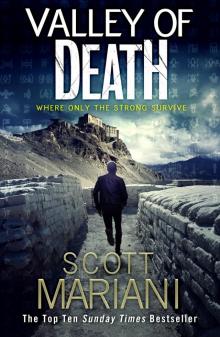 Valley of Death
Valley of Death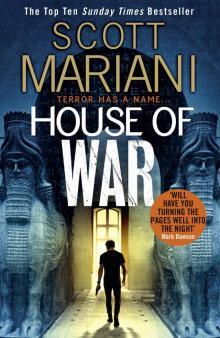 House of War
House of War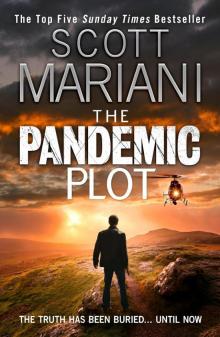 The Pandemic Plot
The Pandemic Plot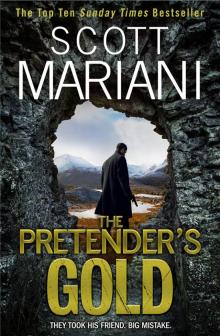 The Pretender's Gold
The Pretender's Gold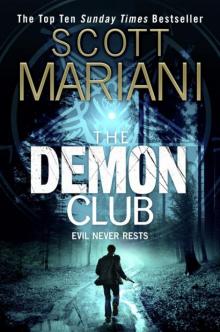 The Demon Club
The Demon Club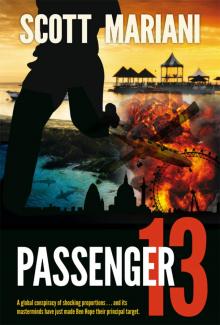 Passenger 13 (Ben Hope eBook originals)
Passenger 13 (Ben Hope eBook originals)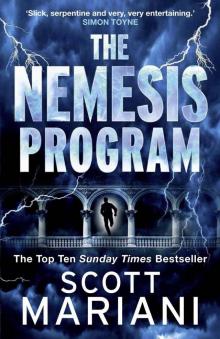 The Nemesis Program_Ben Hope
The Nemesis Program_Ben Hope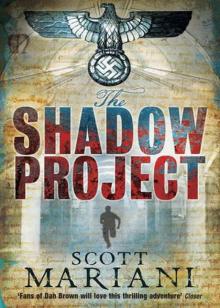 The Shadow Project
The Shadow Project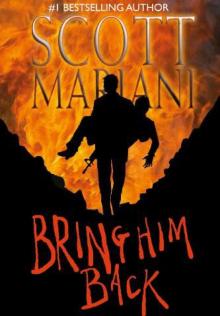 Bring Him Back
Bring Him Back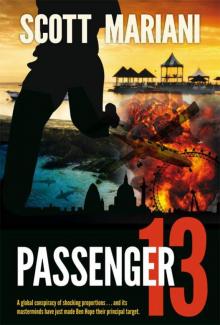 Passenger 13
Passenger 13 Sacred Sword (Ben Hope 7)
Sacred Sword (Ben Hope 7)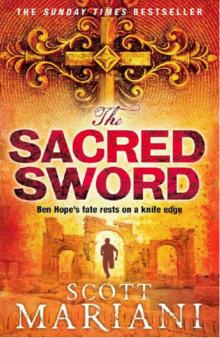 The Sacred Sword (Ben Hope 7)
The Sacred Sword (Ben Hope 7)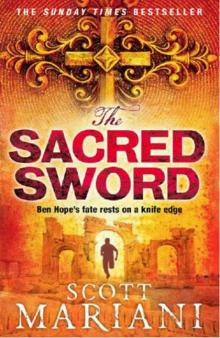 Sacred Sword
Sacred Sword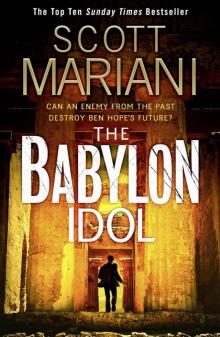 The Babylon Idol
The Babylon Idol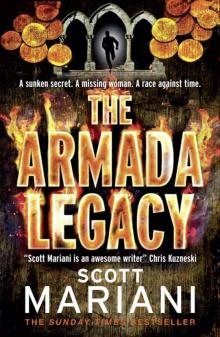 The Armada Legacy
The Armada Legacy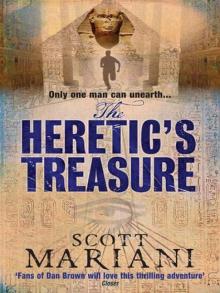 The Heretic's Treasure
The Heretic's Treasure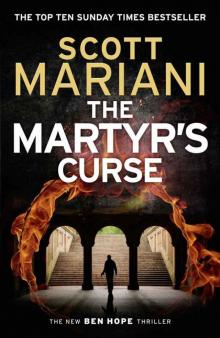 The Martyr’s Curse
The Martyr’s Curse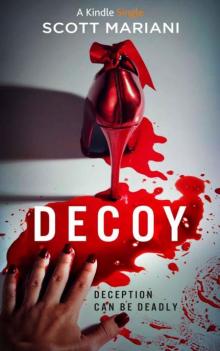 DECOY (Kindle Single)
DECOY (Kindle Single)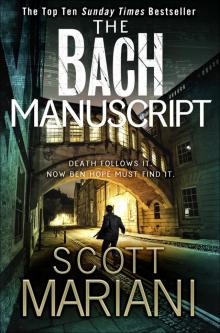 The Bach Manuscript
The Bach Manuscript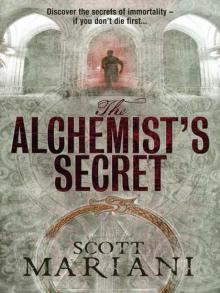 The Alchemist's Secret
The Alchemist's Secret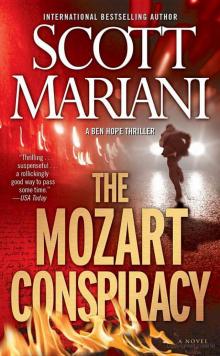 The Mozart Conspiracy: A Novel bh-2
The Mozart Conspiracy: A Novel bh-2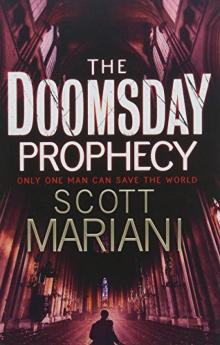 The Doomsday Prophecy
The Doomsday Prophecy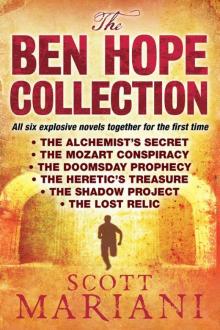 The Ben Hope Collection: 6 BOOK SET
The Ben Hope Collection: 6 BOOK SET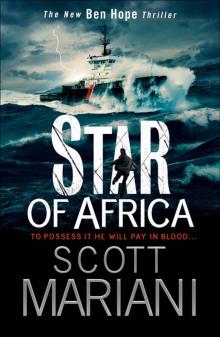 Star of Africa (Ben Hope, Book 13)
Star of Africa (Ben Hope, Book 13)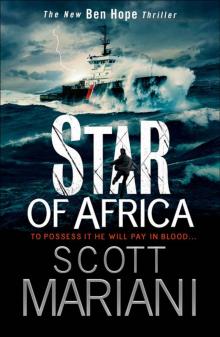 Star of Africa
Star of Africa The Forgotten Holocaust (Ben Hope, Book 10)
The Forgotten Holocaust (Ben Hope, Book 10)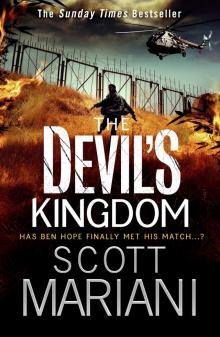 The Devil's Kingdom
The Devil's Kingdom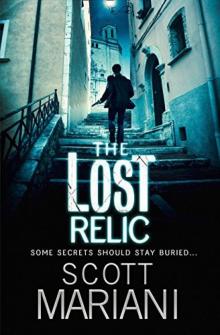 The Lost Relic
The Lost Relic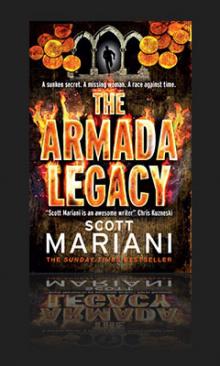 The Armada Legacy bh-8
The Armada Legacy bh-8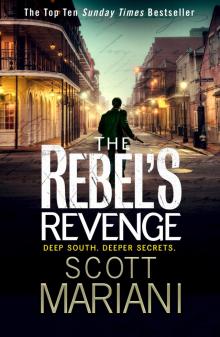 The Rebel's Revenge
The Rebel's Revenge The Forgotten Holocaust
The Forgotten Holocaust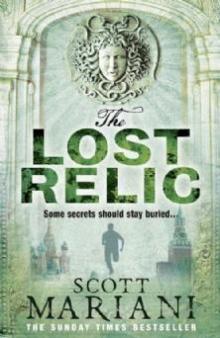 The Lost Relic bh-6
The Lost Relic bh-6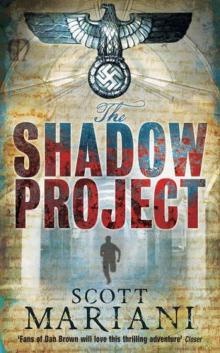 Ben Hope 05 - The Shadow Project
Ben Hope 05 - The Shadow Project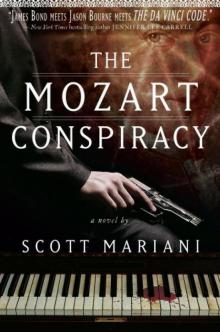 The Mozart Conspiracy
The Mozart Conspiracy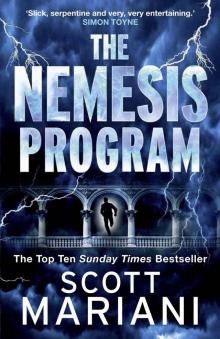 The Nemesis Program
The Nemesis Program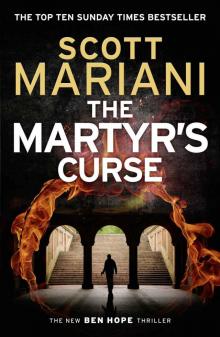 The Martyr’s Curse (Ben Hope, Book 11)
The Martyr’s Curse (Ben Hope, Book 11)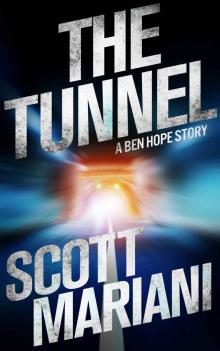 THE TUNNEL: A Ben Hope Story
THE TUNNEL: A Ben Hope Story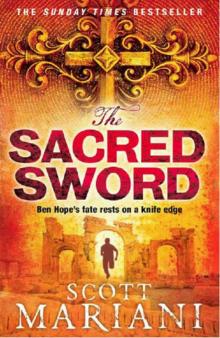 The Sacred Sword bh-7
The Sacred Sword bh-7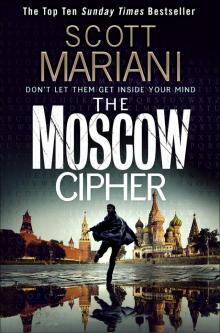 The Moscow Cipher
The Moscow Cipher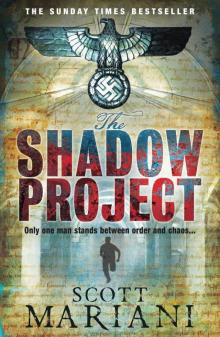 The Shadow Project bh-5
The Shadow Project bh-5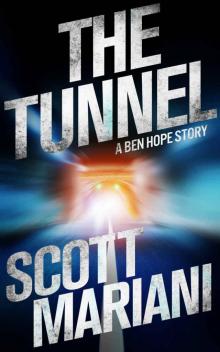 The Tunnel
The Tunnel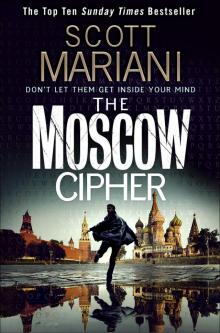 The Moscow Cipher (Ben Hope, Book 17)
The Moscow Cipher (Ben Hope, Book 17)